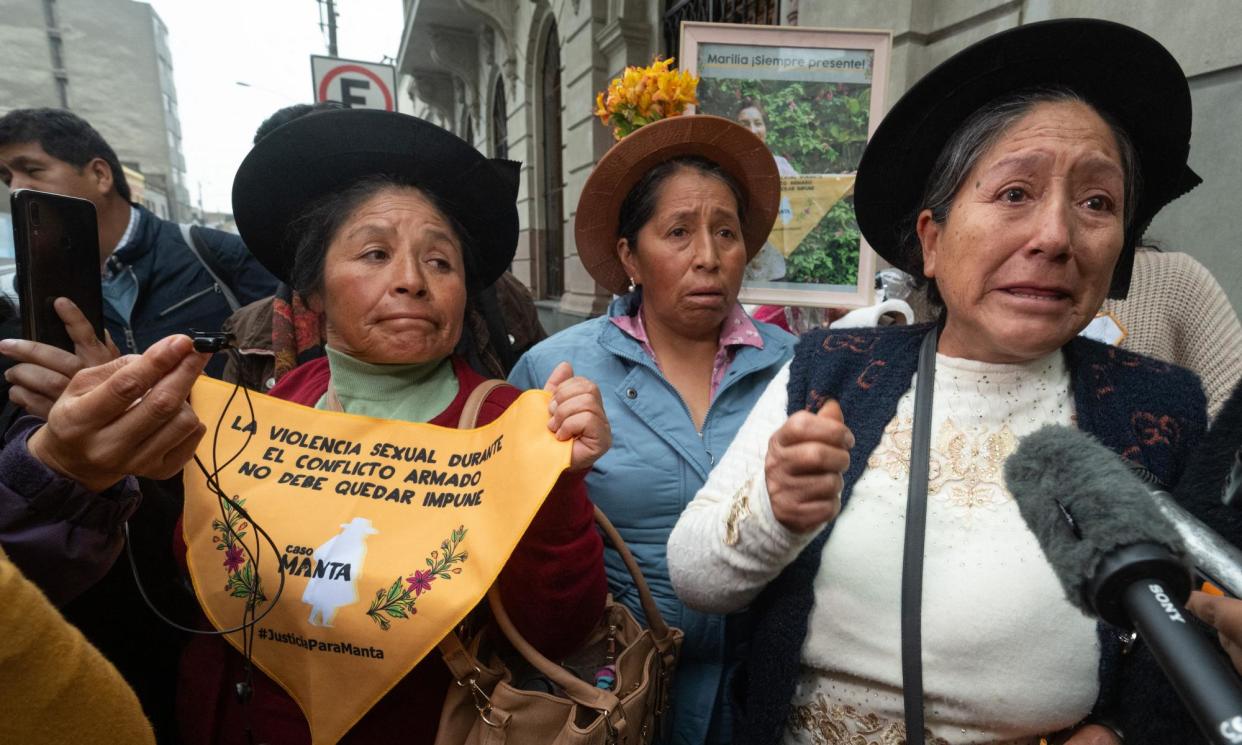Peruvian soldiers found guilty of rapes committed during civil war in historic verdict

Ten soldiers have been found guilty at a court in Lima of crimes against humanity for rapes committed four decades ago during Peru’s civil war.
In what is being hailed as a landmark verdict, a panel of three judges on Wednesday said the systematic use of rape by soldiers in the Manta y Vilca case – named after the communities where the abuses took place – qualified as a crime against humanity.
“It is not legitimate that strategies of sexual violence be used as an intimidation method,” the court said.
The case is the first collective proceeding in Peru over the mass use of sexual violence during the state’s conflict with the Mao-inspired Shining Path rebels, which caused 69,000 deaths and disappearances between 1980 and 2000.
Six of the nine women who took legal action were in court to hear the verdicts. One, known as Marilia, died in March without seeing justice served. Her friend and fellow survivor, María, was in tears after the verdicts.
“Marilia told me, she would have liked [to see] these wretches behind bars for what they did to us,” said María. “They caused us so much harm. And we haven’t been able to move forward until now because of these soldiers. But I am glad that those guilty will pay for this.”
The convicted men were given prison sentences ranging from six to 12 years and ordered to pay 100,000 soles (£20,500) to each of their victims, who were all Quechua-speaking women from a rural Andean community.
Testimonies, read out by a judge, detailed how soldiers deployed to fight Maoist rebels used their position to systematically intimidate, persecute and rape women and girls as young as 14.
As a teenager, María was repeatedly raped by different soldiers over several years and had two pregnancies as a result.
“We were young girls,” she said. “And they sent the army to all the rural zones, to various departments, where they carried out abuses. Abuse, rape, torture, killings. I’m a witness of that.”
Related: Children of Vietnam war’s rape survivors unjustly bear the burden of others’ crimes | Tran Thi Ngai
Cynthia Silva, the director of Demus, a rights organisation that represented three of the women, said: “It is a first recognition of the rights of these women, but also of their life stories, which have been marked and damaged by these traumatic experiences of rape … and this is the first case with these characteristics to reach sentencing in the history of South America.”
While hailing the verdict as “important milestone”, Silva said the sentences were not in proportion to the crimes committed.
“When we talk about crimes against humanity, we are talking about acts of such a serious nature, such a high magnitude, that we cannot fail to recognise that the penalties corresponding to these extremely serious acts must also be, accordingly, serious,” Silva said.
A registry of victims of Peru’s conflict held by the justice ministry records more than 5,300 rape survivors. The country’s truth and reconciliation commission, whose final report detailed human rights abuses committed by both sides, found state agents, notably the armed forces, to be responsible for 83% of cases of sexual violence.
The verdict comes at a crucial moment for human rights in Peru. Earlier this month, its congress voted to pass a bill to make crimes against humanity committed before 2002 subject to the statute of limitations. The bill, which awaits a second vote in congress, has been criticised by human rights organisations for undermining accountability for past human rights violations.


